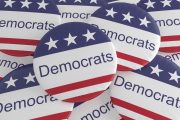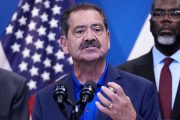
Some 800,000-900,000 non-citizen residents of New York City will soon have a say in local elections, per legislation passed by the City Council.
With a vote of 33 to 14, with two abstentions, the City Council passed the “Our City Our Vote” legislation Thursday, granting non-citizens the right to vote in all municipal elections. Those new voters will include “any New Yorker who is a lawful permanent resident or authorized to work in the United States, who has been a resident of New York City for at least 30 consecutive days, and who meets all the qualifications for registering to vote under the Election Law other than U.S. citizenship,” per the City Council press release.
All “eligible” non-citizens are able to start registering to vote as of December 9, 2022, and once registered, can begin voting in local elections as of January 9, 2023.
The Board of Elections (BOE) will be tasked to develop a brand-new registration form for non-citizen municipal voters. Among other provisions, such forms will need to be translated into any languages that U.S. citizen voter registration forms are translated into under state and federal law (currently, such forms must be translated into Spanish, Bengali, Korean, and Chinese), the council provides. All federal, state, and local confidentiality policies that apply to U.S. citizens will be equally applied to non-citizen voters. The latter will also be eligible to enroll in a political party for purposes of voting in local primary elections.
Council Member Ydanis Rodriguez, who introduced the bill, said that as residents of “one of the most diverse cities in the world,” all New Yorkers need “adequate representation” regardless of their citizenship status. “Immigrants in New York City own over half of the local businesses and contribute over $190 billion dollars to the citywide GDP. During the height of the pandemic, it was our immigrant New Yorkers who kept New York City running,” Rodriguez argued.
He added that he hopes the legislation will inspire similar initiatives elsewhere. “This is important not only for the city of New York,” Rodriguez said. “There are so many people in Texas and other places that they want to push our society back.”
Chair of the New York State Republican Committee Nick Langworthy called the bill “perhaps the worst idea out of New York City Democrats ever.”
“This radical legislation is unconstitutional, un-American and downright dangerous. This not only will undermine the credibility of local city elections but will undoubtedly interfere with the integrity of state and national elections across New York State. Democrats do not get to create their own brand of citizenship to manipulate elections,” Langworthy stated, pledging to “use every single legal method to stop it.”
Minority Leader Joe Borelli joined Langworthy in condemning the legislation, noting that the New York Democrats will be granting a right to vote to people who are citizens of other countries, and have a right to vote there. “If they want to vote here, they should go through the process of becoming citizens, because that is how you show a real commitment to being a part of this city and this country,” he added.
Even the outgoing far-left New York Mayor Bill de Blasio expressed his disapproval of the concept of allowing non-citizens voting in the U.S. elections, saying he had “reservations” about that.
“I want citizenship to be something that people pursue fully, quickly, every chance they get,” de Blasio said. “I’m concerned about that. I’m also concerned about the legal question, which is unclear whether it’s something that can be done on the local level.”
Still, the mayor does not plan to veto the bill.
New York Mayor-elect Eric Adams is all for non-citizens voting. “We need to make sure we give undocumented New Yorkers support they need to allow families to not live in the shadows of [the] American dream,” Adams said in October.
The bill clearly violates New York Constitution, which provides that “Every citizen shall be entitled to vote at every election for all officers elected by the people … provided that such citizen is eighteen years of age or over and shall have been a resident of this state, and of the county, city, or village for thirty days next preceding an election.” (Emphasis added.)
Moreover, note the editors of National Review, the 14th, 15th, 19th, 24th, and 26th Amendments to the U.S. Constitution limit voting rights exclusively to U.S. citizens. The writers further underline the value of a citizenship that serves as a bond between the individual and the country:
There are good reasons why Americans have traditionally limited the vote to citizens. Citizenship is no mere formality…. It is a bond of right, responsibility, and affection between the citizen and the nation. Duties such as voting and jury service have long been essential attributes of citizenship, limited to those who by residence and public declaration of allegiance have permanently joined the community.
Adding the votes of non-citizens would dilute the votes of citizens as well as the value of citizenship itself, the editors believe, as they add that such initiatives come out of the Democrats’ fears of inability to “win elections conducted only among law-abiding American citizens.”
According to Ballotopedia, 14 municipalities across the country allowed non-citizens to vote in local elections as of June 2021. Eleven were located in Maryland, two in Vermont, and the other was San Francisco.





